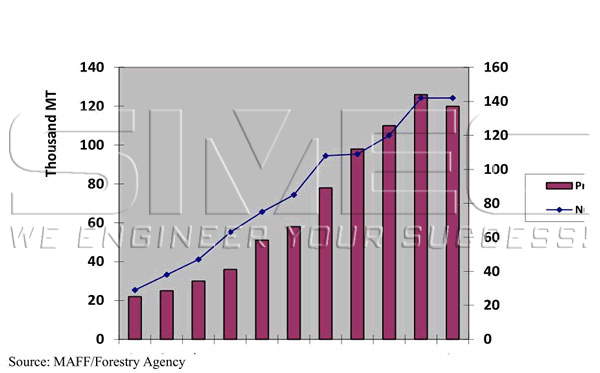Wood Pellet Import in Japan will Increase
Japan recently submitted a report to the US Department of Agriculture (USDA) Overseas Agriculture Bureau Global Agricultural Information Network (GAIN), pointed out that Japan had imported 347,000 tons of wood chips for heating last year, which breaks the highest record before. Imports of wood pellets are likely to increase in the coming years because the trend of mixing wood pellets with coal for thermal power generation is expected to continue, and the number of small and medium-scale biomass power facilities which use wood materials (including wood pellets and PKS) is increasing under the FIT system.

Japan Wood Pellet Import Increase
According to the report, Japan’s FIT incentive for the generation of electricity from biomass has driven a rapid increase in demand for biomass, including domestic and imported wood pellets, and the import of palm kernel shells (PKS). Although Japan has abundant biomass resources, it is unable to harvest and transport those resources economically. Imports of wood pellets and PKS are therefore likely to increase in the coming years as existing coal thermal power plants are able to co-fire with wood pellets or PKS. The report also noted that Japan is considering establishing its own standards to address concerns about environmental sustainability criteria for biomass products.

Japan Wood Pellet Import Increase
According to the report, Japan’s FIT incentive for the generation of electricity from biomass has driven a rapid increase in demand for biomass, including domestic and imported wood pellets, and the import of palm kernel shells (PKS). Although Japan has abundant biomass resources, it is unable to harvest and transport those resources economically. Imports of wood pellets and PKS are therefore likely to increase in the coming years as existing coal thermal power plants are able to co-fire with wood pellets or PKS. The report also noted that Japan is considering establishing its own standards to address concerns about environmental sustainability criteria for biomass products.
| Wood Pellets (1,000 MT) | ||||||||||
| Calendar Year | 2009 | 2010 | 2011 | 2012 | 2013 | 2014 | 2015 | 2016 | 2017 | 2018 |
| Beginning Stocks | N/A | N/A | N/A | N/A | N/A | N/A | N/A | N/A | N/A | N/A |
| Production* | 51 | 58 | 78 | 98 | 110 | 126 | 120 | 125 | 125 | 125 |
| Imports** | 59 | 73 | 74 | 72 | 84 | 97 | 232 | 347 | 400 | 430 |
| Exports** | 3 | 3 | 4 | 3 | 5 | 4 | 0.5 | 0.3 | 0.5 | 0.5 |
| Consumption | 107 | 128 | 148 | 167 | 189 | 219 | 352 | 472 | 525 | 555 |
| Ending Stocks | N/A | N/A | N/A | N/A | N/A | N/A | N/A | N/A | N/A | N/A |
| Production Capacity | ||||||||||
| Number of Plants | ||||||||||
| Nameplate Capacity | N/A | N/A | N/A | N/A | N/A | N/A | N/A | N/A | N/A | N/A |
| Capacity Use(%) | N/A | N/A | N/A | N/A | N/A | N/A | N/A | N/A | N/A | N/A |
N/A = not available and not included in balance.
* The level of production forecast from 2016 on was prepared by Post, based on industry sources.
** The volume of trade forecast for 2017 on was prepared by Post, based on industry sources.
In 2015, Japan’s production of wood pellets was 120,000 MT, and there were 142 biomass pellet plants. Most of Japanese pellet plants scales are very small, with an annual capacity of 100-1000 tons. The production of wood pellets in 2015 decreased by 4.8% from the previous year as demands for heating decreased. According to an industry source, production of wood pellets in 2018 is expected to recover to record-high 2014 levels as the use of cogeneration units running on wood pellets.

Wood Pellet Production and Number of Plants in Japan
In 2016, Japan’s imports of wood pellets increased 49% from the previous year to 347 thousand MT. Of these, 261,000 MT, or 75%, were imported from Canada, followed by Vietnam (18%) and China (6%).
| Key Suppliers of Wood Pellets to Japan | |||||||
|
Partner Country |
Quantity (Metric Tons) | ||||||
| 2012 | 2013 | 2014 | 2015 | 2016 | Jan-Apr 2016 | Jan-Apr 2017 | |
| World | 71,981 | 83,769 | 96,745 | 232,425 | 346,855 | 100,888 | 123,853 |
| Canada | 66,470 | 72,151 | 90,676 | 146,150 | 260,935 | 81,590 | 82,059 |
| Vietnam | 3,533 | 2,897 | 1,979 | 27,440 | 62,441 | 13,304 | 39,204 |
| China | 653 | 5,242 | - | 57,870 | 20,733 | 5,250 | 9 |
| Malaysia | 393 | 1,170 | 128 | 162 | 1,418 | 68 | 1,911 |
| Thailand | 265 | 1,242 | 2,682 | 194 | 451 | 208 | 409 |
| Indonesia | 15 | 629 | 410 | 304 | 425 | 113 | 120 |
| United States | 233 | 326 | 563 | 237 | 306 | 70 | 84 |
Note: HS Code 4401.31
| Japan - Import Price of Wood Pellets | |||||
|
Partner Country |
U.S. Dollars per Metric Ton | ||||
| 2012 | 2013 | 2014 | 2015 | 2016 | |
| World | 269 | 242 | 251 | 196 | 182 |
| Canada | 272 | 248 | 255 | 198 | 191 |
| Vietnam | 160 | 176 | 197 | 161 | 136 |
| China | 451 | 215 | 0 | 209 | 199 |
| Malaysia | 164 | 152 | 157 | 142 | 127 |
| Thailand | 200 | 135 | 138 | 162 | 137 |
| Indonesia | 177 | 174 | 146 | 142 | 183 |
| United States | 418 | 453 | 477 | 441 | 430 |
Note: HS Code 4401.31
Japan’s imports of PKS are also increasing as a source for biomass power generation. In 2016, imports of PKS increased by 67% from the previous year to 761,410 MT, most of which came from Indonesia and Malaysia.
| Japan Import Statistics | |||||
| Commodity: 2306.60.000, Palm Kernel Shells and Others | |||||
|
Partner Country |
Quantity (Metric Tons) | ||||
| 2012 | 2013 | 2014 | 2015 | 2016 | |
| World | 26,211 | 131,224 | 244,178 | 456,084 | 761,410 |
| Indonesia | 8,673 | 62,645 | 131,678 | 255,104 | 398,171 |
| Malaysia | 17,143 | 68,560 | 112,500 | 200,913 | 363,239 |
Source: The World Trade Atlas
Japan has a zero import tariff for PKS. Imports of PKS as well as wood pellets are expected to increase for years to come.
SIMEC has built several wood pellet projects in Southeast Asia this year. 50% of the new projects will export wood pellets to Japan.
Southeast Asian countries have the natural advantages of producing and exporting biomass wood pellets. With rich raw material resources, policy support, and huge overseas market, investment in wood pellet project will have a high economic return.
SIMEC is committed to the development and manufacture of biomass processing equipment, including crushing, drying, pelleting, cooling and packaging. We can supply complete biomass pellet plant.
If you are interested in biomass wood pellet project, please send your enquiry to info@simecpellet.com.
Southeast Asian countries have the natural advantages of producing and exporting biomass wood pellets. With rich raw material resources, policy support, and huge overseas market, investment in wood pellet project will have a high economic return.
SIMEC is committed to the development and manufacture of biomass processing equipment, including crushing, drying, pelleting, cooling and packaging. We can supply complete biomass pellet plant.
If you are interested in biomass wood pellet project, please send your enquiry to info@simecpellet.com.